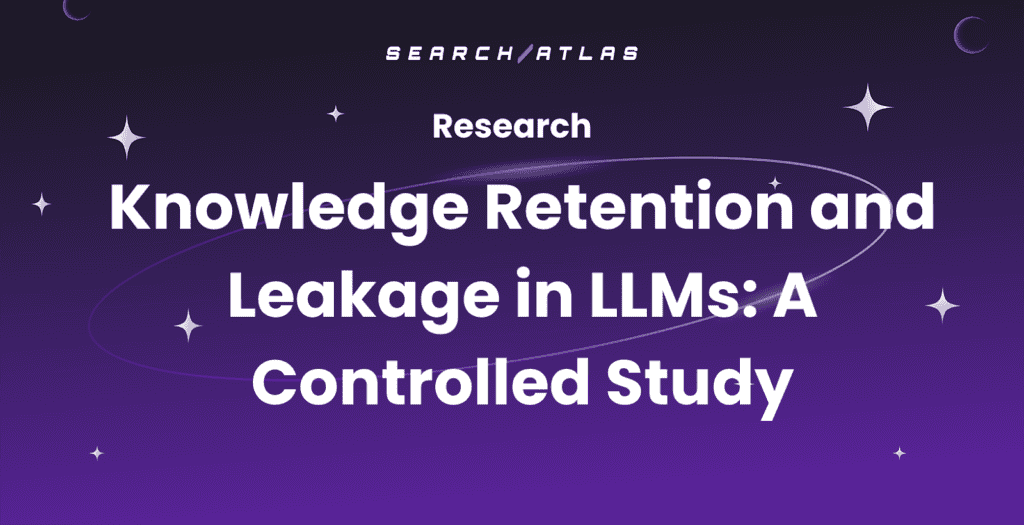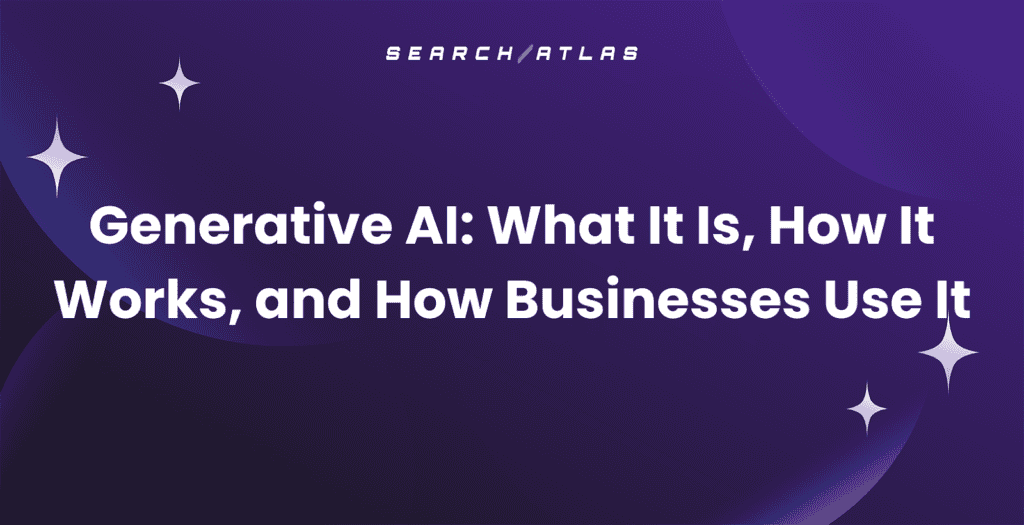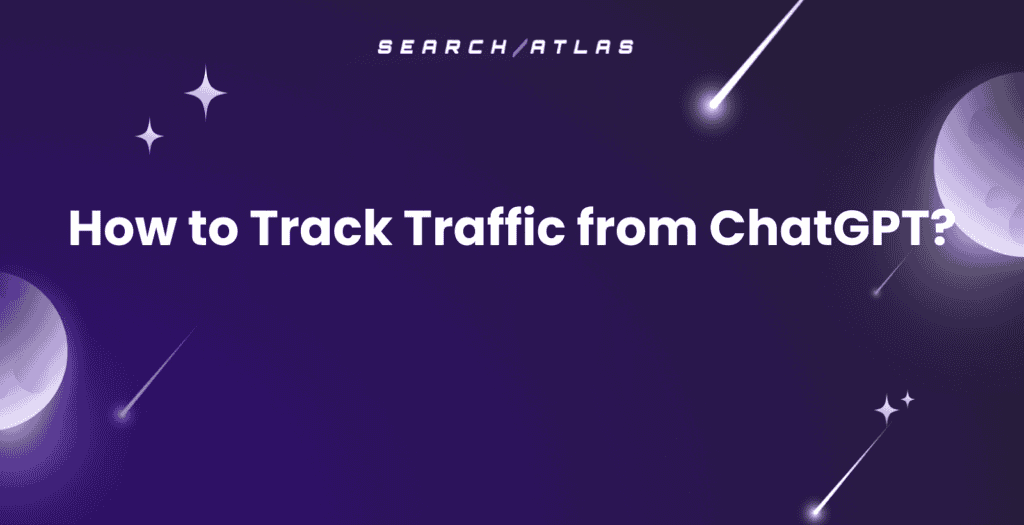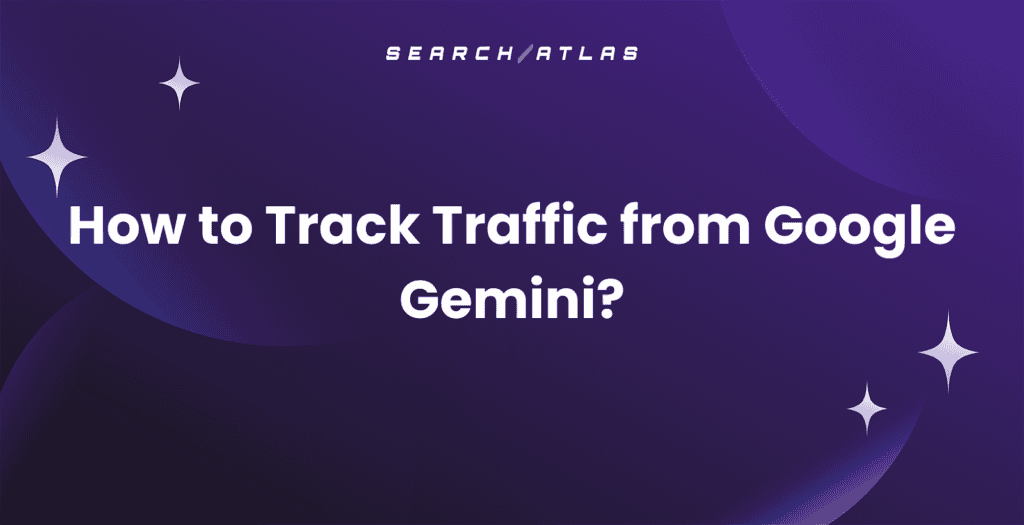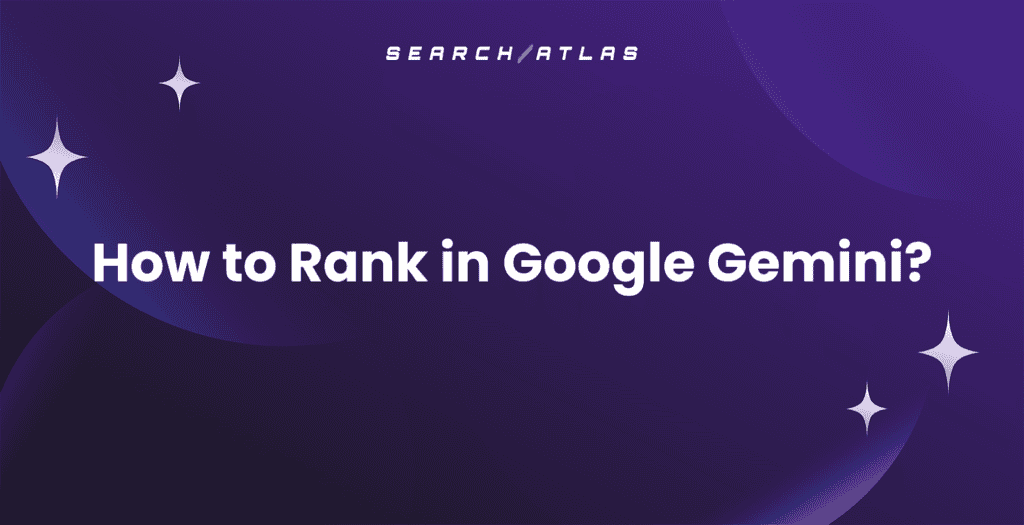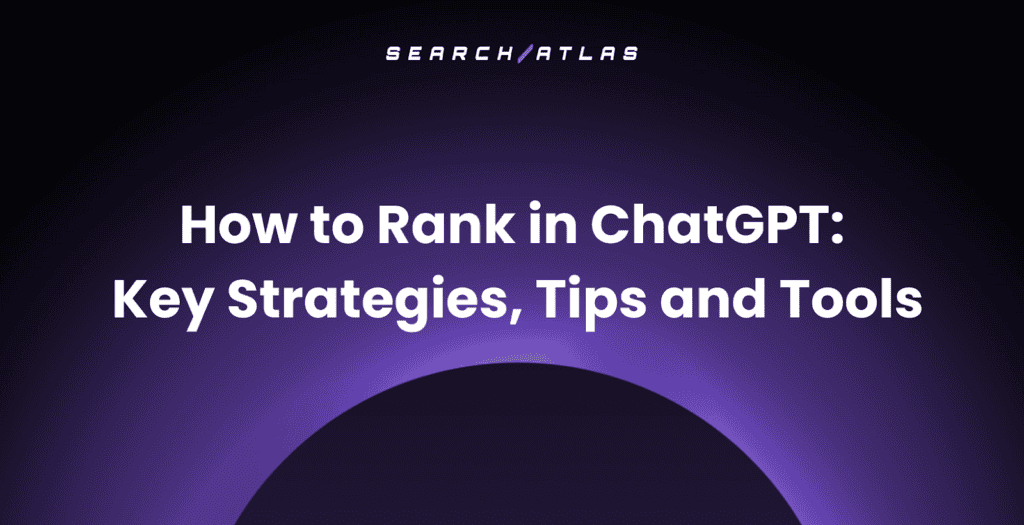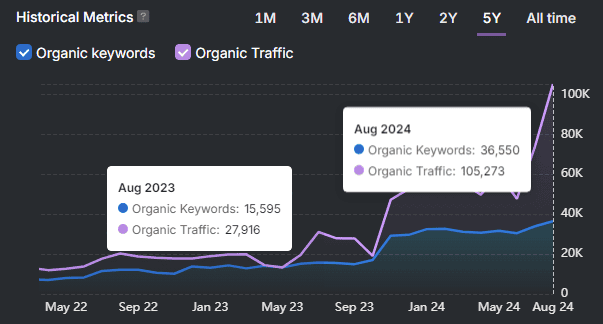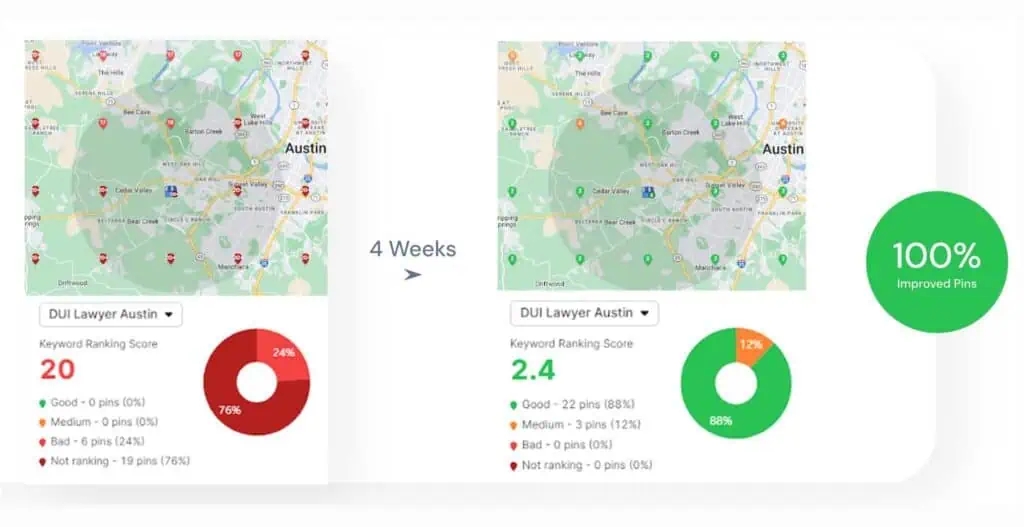Brightlocal alternatives are local SEO platforms that replace Brightlocal for core functions such as rank tracking, Google Business Profile (GBP) management, citation building, and review reporting. SEO teams rely on sites like Brightlocal when they need scalable map pack visibility, cleaner reporting interfaces, or automation for multiple locations. These Brightlocal competitors offer faster SERP refreshes, robust Google-native integrations, and more consistent platform performance.
The top three BrightLocal alternatives in 2025 are Search Atlas, Birdeye, and Yext. Search Atlas delivers end-to-end local SEO automation, heatmaps, and Google-native rank data. Birdeye specializes in multi-location review management and customer feedback automation. Yext offers unmatched citation control, real-time directory sync, and structured data for enterprise brands.
The 15 best Brightlocal alternatives for every budget and use case are listed below.
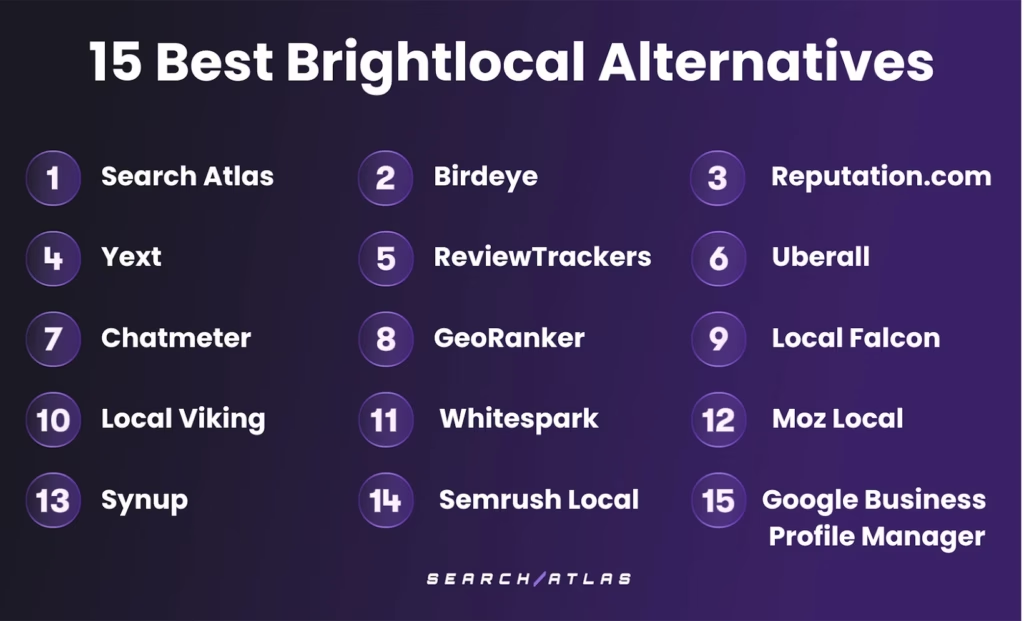
1. Search Atlas
Search Atlas is an alternative to Brightlocal because it’s a full-stack SEO platform that includes a specialized Local SEO Dashboard for agencies and multi-location brands. The Search Atlas platform integrates directly with Google Search Console (GSC) and Google Business Profile (GBP) to deliver real-time rank tracking, GBP management, review automation, and citation submissions.
Compared to BrightLocal, Search Atlas is the best alternative for local rank tracking, GBP optimization, and automated reputation management. The Search Atlas Local SEO Heatmap Tool visualizes local rankings on a geo-grid. Users are able to move the grid center, compare date ranges, and monitor competitors across specific pin clusters.
The Search Atlas Citation Builder pushes business listings to top aggregators such as Data Axle, Localeze, and Yellow Pages Network. The tool tracks submission progress, citation value, and metrics inside the dashboard.
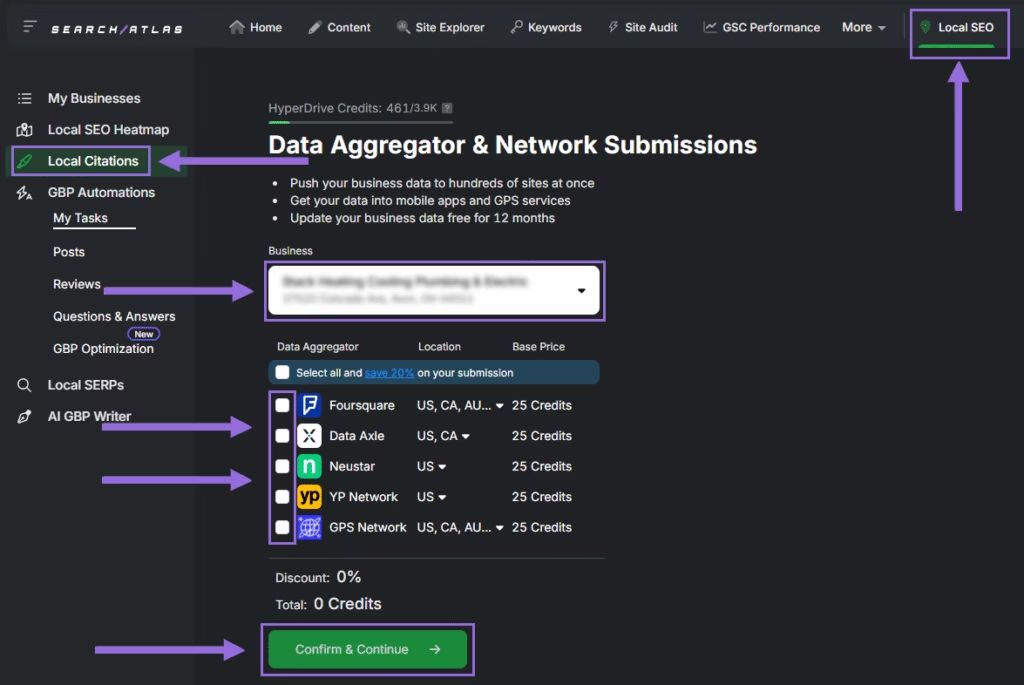
BrightLocal relies on a rigid credit system, slower updates, and limited integrations. Search Atlas supports bulk AI-powered GBP posts, Q&A generation, and review replies, all with custom tone and image settings. Users manage all assets in one dashboard instead of switching between modules.
Search Atlas pricing starts at $99/month for full platform access with scalable AI quotas. All plans include GBP integrations, heatmaps, citation submission, review automation, and technical audits. There is no credit gating on core features.
Pros highlighted in the Search Atlas SEO tool review include live data from Google sources, bulk GBP automation with approval flows, and AI-generated content for reviews, posts, and Q&A. The con of Search Atlas is a steeper learning curve for users unfamiliar with automation or enterprise dashboards.
Search Atlas is the best BrightLocal alternative for users who need automated local SEO execution, Google-native rank tracking, and multi-location campaign scaling.
2. Birdeye
Birdeye is an alternative to Brightlocal because it’s a reputation and customer experience platform built for multi-location businesses. It manages GBP (Google Business Profile) listings, review generation, surveys, social media content, AI-driven responses, and omnichannel messaging through a unified dashboard. Birdeye uses proprietary AI agents like BirdAI and Brand AI to automate engagement, personalize replies, and maintain brand voice across every location.
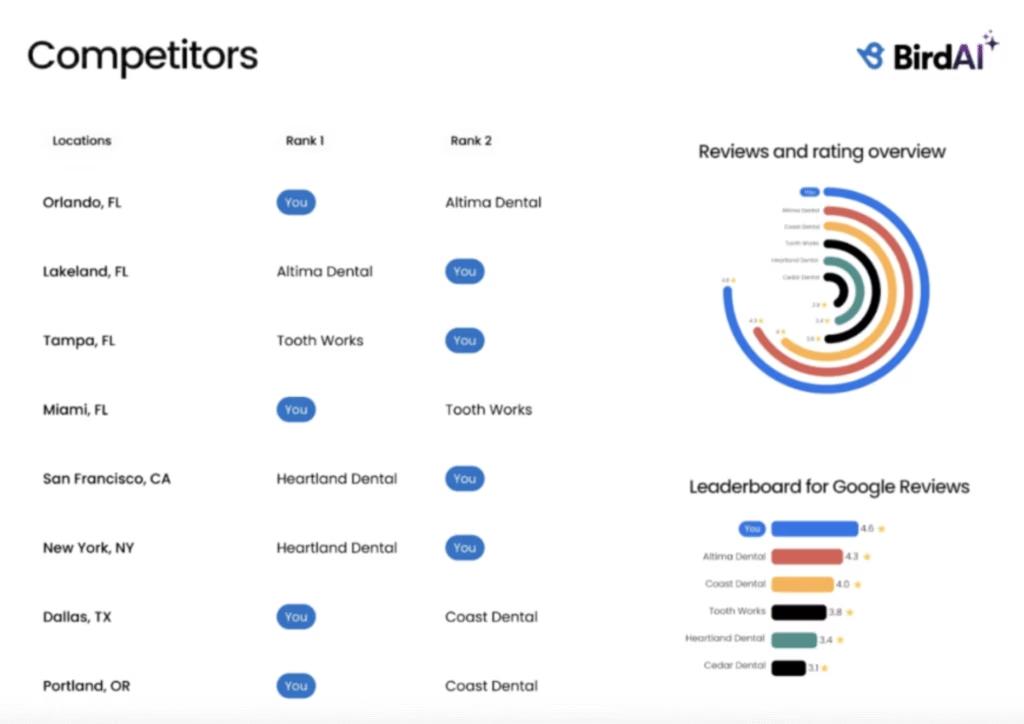
Birdeye is the best BrightLocal alternative for enterprise-level review and reputation management. BrightLocal supports review monitoring, but Birdeye automates the entire lifecycle (from request to response to reporting) across SMS, email, webchat, and social platforms. It supports HIPAA-compliant texting, integrates with over 3,000 CRMs and POS tools, and handles multi-location workflows natively.
Birdeye is a premium paid tool, with pricing that starts around $299/month and scales based on the number of locations and features activated.
Pros in our Birdeye review include AI-generated responses, real-time alerts, CRM and GMB integrations, customer sentiment insights, and a shared inbox for team coordination. The main drawbacks of Birdeye are a higher price and limited customization of texting numbers or templates for high-security industries.
3. Reputation.com
Reputation.com is an alternative to Brightlocal because it’s an enterprise-grade reputation and customer experience platform that aggregates, analyzes, and responds to feedback across reviews, surveys, and social mentions. It integrates first-party feedback with third-party data from hundreds of online sources to produce a unified view of brand performance at the corporate, regional, and location levels.
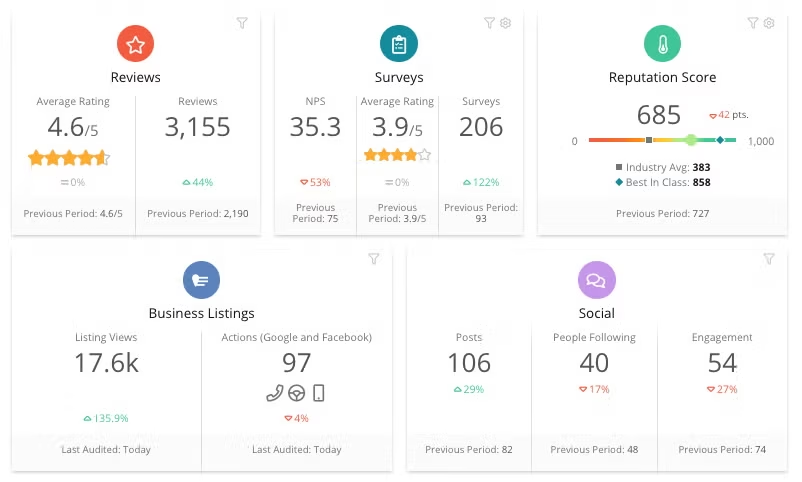
In the BrightLocal vs. Reputation.com comparison, Reputation.com is the best BrightLocal alternative for multi-channel feedback management and sentiment analysis at scale. BrightLocal monitors reviews and supports GBP reporting, but Reputation.com adds competitive benchmarking, predictive insights, and a proprietary Rep Score that correlates directly with sales performance. Its AI-based workflows help enterprises act on feedback faster, recover service issues, and protect brand credibility in real time.
Reputation.com is a premium paid platform, with pricing available upon request based on the number of locations, data sources, and feature modules activated.
Pros in our Reputation.com review include robust sentiment tracking, competitive benchmarks, HIPAA compliance for healthcare, and deep vertical support for automotive, property management, and hospitality. The cons of Reputation.com are a steeper learning curve for new users and enterprise-level pricing that can be prohibitive for smaller businesses.
4. Yext
Yext is an alternative to Brightlocal because it’s a digital presence management platform that centralizes listings, reviews, and location data for multi-location businesses. Yext connects to over 200 directories, including Google Maps, Apple Maps, Facebook, and Amazon Alexa, and pushes real-time updates from a centralized Knowledge Graph.
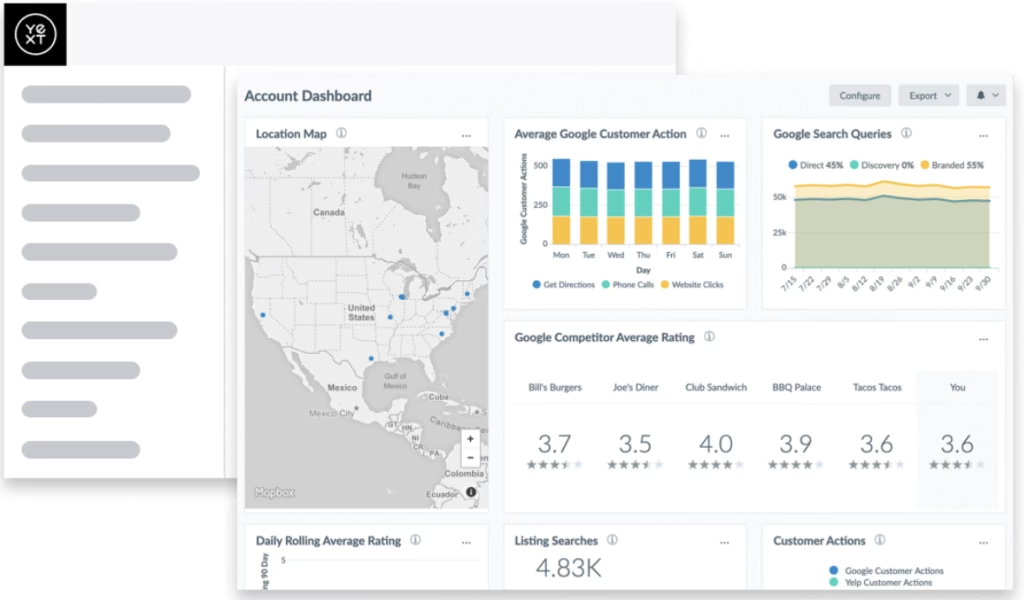
In the BrightLocal vs Yext comparison, Yext is the best BrightLocal alternative for multi-location listing accuracy and branded presence at scale. BrightLocal helps with citations and review generation, but lacks structured data sync, a landing page builder, and dynamic content delivery across hundreds of platforms that Yext provides. Yext ensures your business profile stays consistent across major search, social, and map platforms, which supports discoverability, compliance, and brand control.
Yext offers tiered pricing for SMBs (small and medium-sized businesses) and enterprises. Small businesses’ access plans start at $4/week for limited directory coverage, while enterprise packages bundle reviews, analytics, and location pages, starting at $10 to $19/week per location.
Pros of Yext include automated listing sync, real-time review monitoring, and SEO-optimized location pages. Our Yext review shows that it supports structured content deployment at scale, which makes it ideal for franchises, healthcare networks, and financial services.
Cons of Yext include difficult-to-edit configurations, steep pricing for smaller businesses, and reporting dashboards that require onboarding to interpret effectively.
When looking at BrightLocal vs. Yext, Yext offers broader listing distribution and AI-powered content management, while BrightLocal focuses more on local SEO audits, GBP reporting, and citation tracking.
5. ReviewTrackers
ReviewTrackers is an alternative to Brightlocal because of its review and reputation management platform designed for multi-location brands to collect, monitor, and analyze customer feedback from across the web. ReviewTrackers centralizes reviews from hundreds of sources, automates review requests, and offers sentiment analysis to improve brand perception and retention.
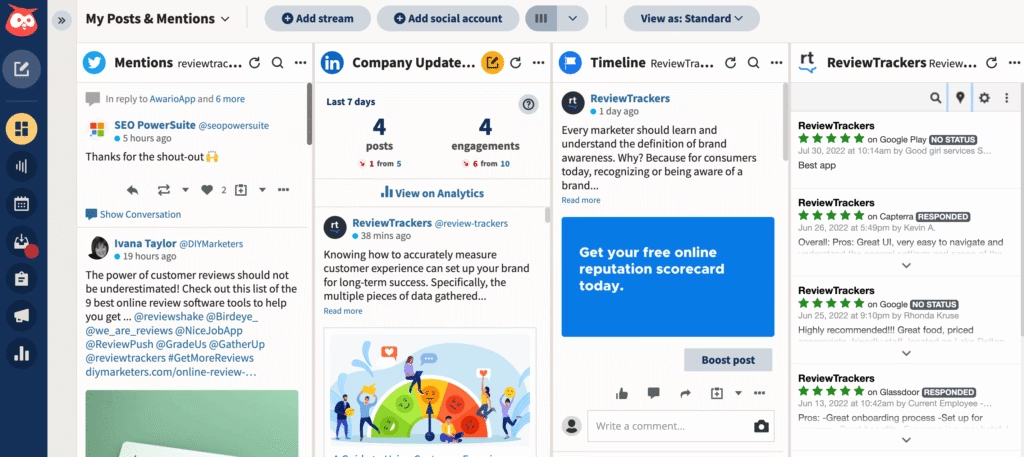
ReviewTrackers is a Brightlocal alternative for businesses that want advanced review analytics, competitive benchmarking, and multi-channel feedback collection. While BrightLocal offers review monitoring and reporting, ReviewTrackers adds competitor analysis, employer brand monitoring, app store review tracking, and customizable alerts to escalate service issues. ReviewTrackers integrates with CRM (Customer Relationship Management) and marketing platforms to connect review insights directly with business workflows.
ReviewTrackers is a paid BrightLocal alternative, with pricing available upon request depending on the number of locations, review sources, and add-on modules.
Pros in our ReviewTrackers review include robust sentiment analytics, competitor tracking, customizable review request campaigns, and integration with local SEO strategies to boost GBP rankings. The main cons of ReviewTrackers are the lack of transparent pricing and a learning curve for configuring competitive intelligence reports.
In the BrightLocal vs. ReviewTrackers comparison, ReviewTrackers delivers deeper customer insight and competitive context, while BrightLocal focuses on local SEO audits, citation building, and GBP performance tracking.
6. Uberall
Uberall is an alternative to Brightlocal because it’s an AI-powered location marketing platform for multi-location businesses that need to control listings, reviews, and local SEO performance from a single dashboard. Uberall centralizes location data, syncs business profiles across 125+ directories, manages review responses at scale, and creates SEO-optimized local pages to boost conversions.
Compared to BrightLocal, Uberall is the best alternative for enterprises that want location performance optimization and AI-assisted review management. BrightLocal offers citation tracking and review monitoring, but Uberall combines real-time listing sync, AI-bulk review replies, local page creation, and geo-targeted ads in one platform, which is better suited for franchises, retail chains, and service networks.
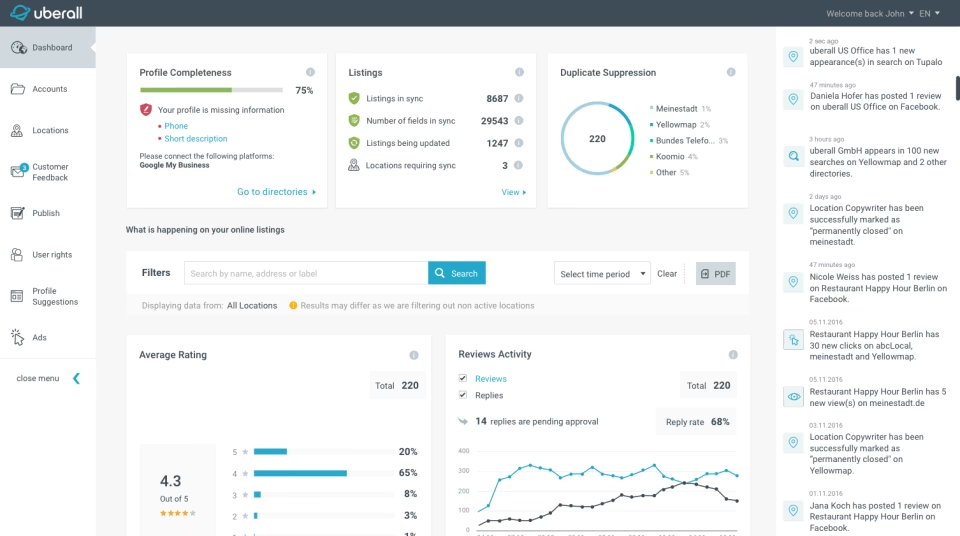
Uberall is a premium paid platform with tiered plans (Show Up, Stand Out, Connect) that bundle listings, reviews, local social posting, and location pages, with add-ons for advanced analytics and integrations. Uberall quotes are available on request.
Highlights from the Uberall review include centralized control across hundreds of listings, AI-assisted engagement, and robust analytics for proving local ROI (return on investment). Uberall cons noted by users include a complex onboarding process and additional costs for unlocking all features.
7. Chatmeter
Chatmeter is an alternative to Brightlocal because it’s an AI-powered local brand and reputation management platform designed for multi-location businesses. It combines listings management, review monitoring, social media tracking, and advanced customer sentiment analysis to help brands maintain consistency and improve visibility across every location.
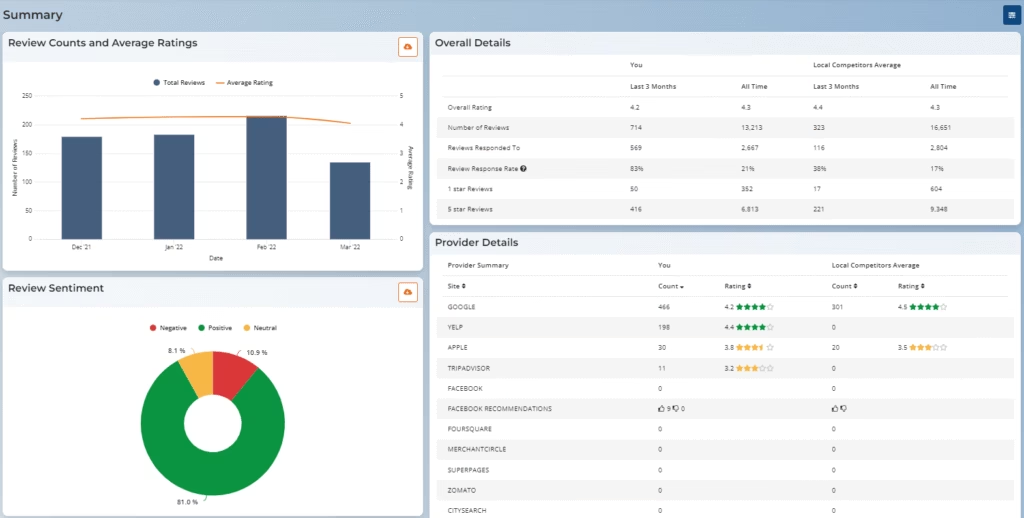
Chatmeter is a good BrightLocal alternative for brands that need enterprise-grade review management with AI-driven insights. While BrightLocal offers review tracking and GBP reporting, the Chatmeter Pulse AI analyzes customer interactions in real time to detect trends, uncover service gaps, and recommend actions. It manages directory listings, monitors social conversations, and benchmarks brand performance against local competitors.
Chatmeter is a premium paid BrightLocal alternative, with pricing available on request based on the number of locations and feature modules.
Pros in our Chatmeter review include AI-powered sentiment detection, multi-location listings control, competitive benchmarking, and integration of social and review data into one dashboard. The main Chatmeter cons are enterprise-level pricing that can be prohibitive for smaller businesses and an onboarding process that requires dedicated training for large teams.
8. GeoRanker
GeoRanker is an alternative to Brightlocal because it’s a local SEO platform that specializes in hyper-local rank tracking, citation discovery, and geo-SERP visualizations. GeoRanker supports businesses and agencies that manage multiple locations or compete in geographically dispersed markets.
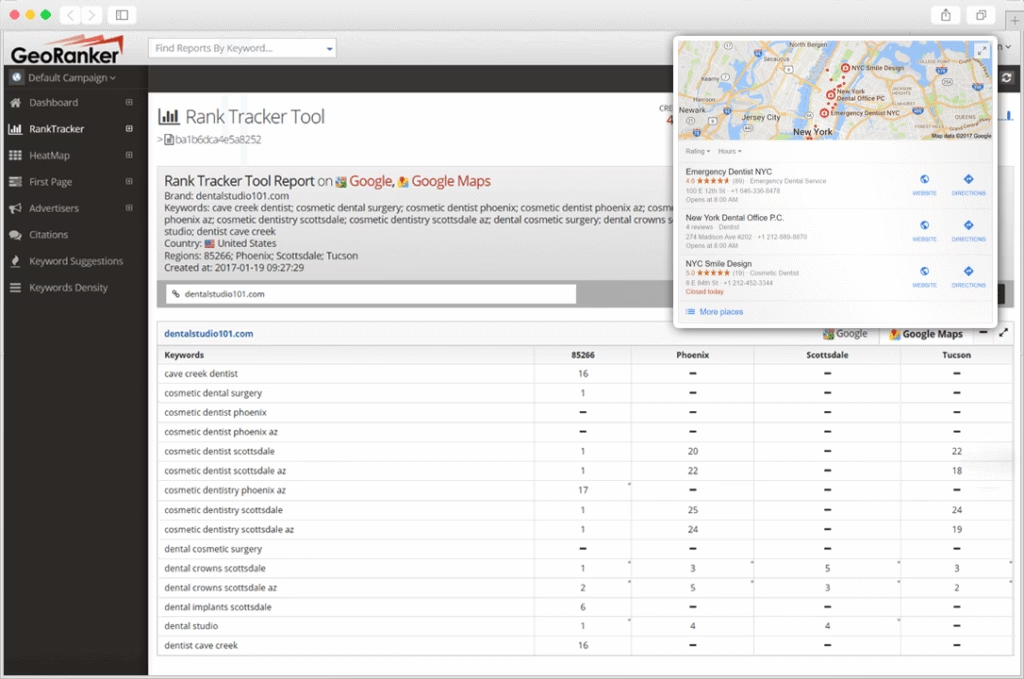
GeoRanker is the best BrightLocal alternative for local SERP snapshots, heatmaps, and geo-based rank tracking. BrightLocal supports city-level tracking, but GeoRanker visualizes keyword performance across precise GPS coordinates using grid-based heatmaps. This helps teams identify gaps in visibility across neighborhoods, zip codes, or service areas. GeoRanker supports automated citation discovery and local backlink audits, which support higher map pack rankings.
GeoRanker is a paid alternative to Brightlocal, and it offers tiered pricing starting at $99/month for 10,000 monthly credits and scales to $490/month for enterprise tracking. Each plan defines limits based on credits, keywords, and locations.
The positive aspects noted in the GeoRanker review include flexible geo-grid reporting, scalable credit usage, and built-in audit tools. It works well for agencies that report performance across client locations. The negative aspects of GeoRanker include interface usability issues and minor fluctuations in geo-rank accuracy, especially for less competitive local terms.
Contrasting BrightLocal vs. GeoRanker, GeoRanker offers more precise geo-grid rank tracking and heatmap visualizations, while BrightLocal provides broader citation tools and easier reporting.
9. Local Falcon
Local Falcon is an alternative to Brightlocal because it’s a local SEO platform that specializes in multipoint Google Business Profile (GBP) rank tracking, AI-driven analysis, and geo-grid visualizations. Local Falcon supports businesses and agencies that need detailed, neighborhood-level visibility insights and competitor benchmarking.
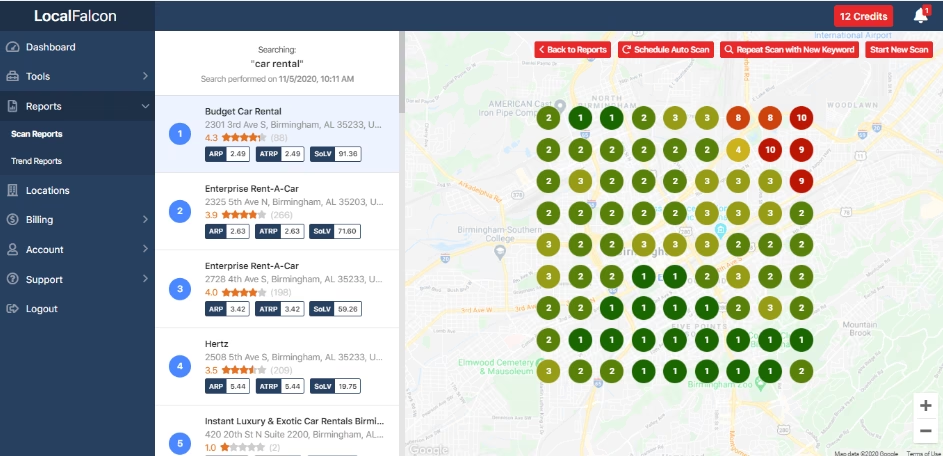
Local Falcon is the best BrightLocal substitute for hyper-local map pack tracking and coverage analysis. BrightLocal offers city-level ranking data, but Local Falcon maps keyword positions across precise GPS pin drops, providing a visual representation of visibility in each grid cell. Its Share of Local Voice (SoLV) metric measures how often a business appears in the map pack for a specific search term and radius, and Falcon AI generates optimization recommendations based on scan data.
Local Falcon is a paid BrightLocal alternative, with pricing starting at $24/month and scaling based on scan volume and location count.
Benefits cited in the Local Falcon review include highly granular rank tracking, automated scan scheduling, AI-assisted insights, and competitor comparison within the same map area.
The cons of the Local Falcon include a steeper learning curve for multi-location management and a credit-based system that may require higher tiers for large-scale campaigns.
In the BrightLocal vs. Local Falcon comparison, Local Falcon delivers more precise geo-grid rank visualizations and AI optimization guidance, while BrightLocal provides broader local SEO audits, citation tools, and integrated review management.
10. Local Viking
Local Viking is an alternative to Brightlocal because it’s a Google Business Profile (GBP) management platform that focuses on GBP post automation, geo-grid rank tracking, and multi-location reporting. Local Viking supports agencies and enterprises that need centralized control over GBP content, location insights, and review responses across multiple profiles.
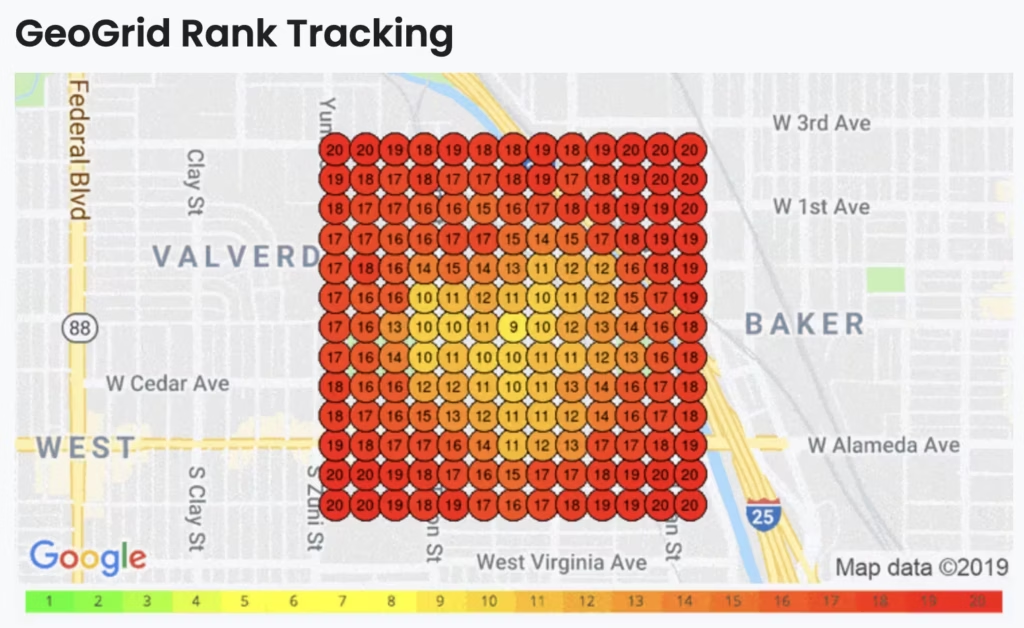
Local Viking is a better BrightLocal alternative for GBP post scheduling and advanced geo-grid visibility tracking. BrightLocal offers standard ranking reports and post publishing, but Local Viking provides bulk post automation with spintax, recurring posts, daisy chaining, and multi-location publishing from one dashboard. Its geo-grid rank tracker visualizes keyword performance across customizable map grids, allowing users to detect hyper-local visibility gaps and measure progress over time.
Local Viking is a paid BrightLocal alternative, with pricing starting at $39/month for one GBP listing and scaling to $200/month for 70 listings with white-label reporting and expanded geo-grid credits.
Positive aspects noted in the Local Viking review include efficient multi-location posting, automated scheduling with advanced formatting, and granular geo-grid reporting that enhances client presentations. Downsides of Local Viking include occasional delays in scheduled post publishing and a learning curve for interpreting grid-based ranking data at scale.
11. Whitespark
Whitespark is an alternative to Brightlocal because it’s a local SEO software and services provider known for manual citation building, GBP management, and local SEO reporting. Whitespark tools are sold individually, allowing businesses to select only the features they need, such as citation finding, review management, or local rank tracking.
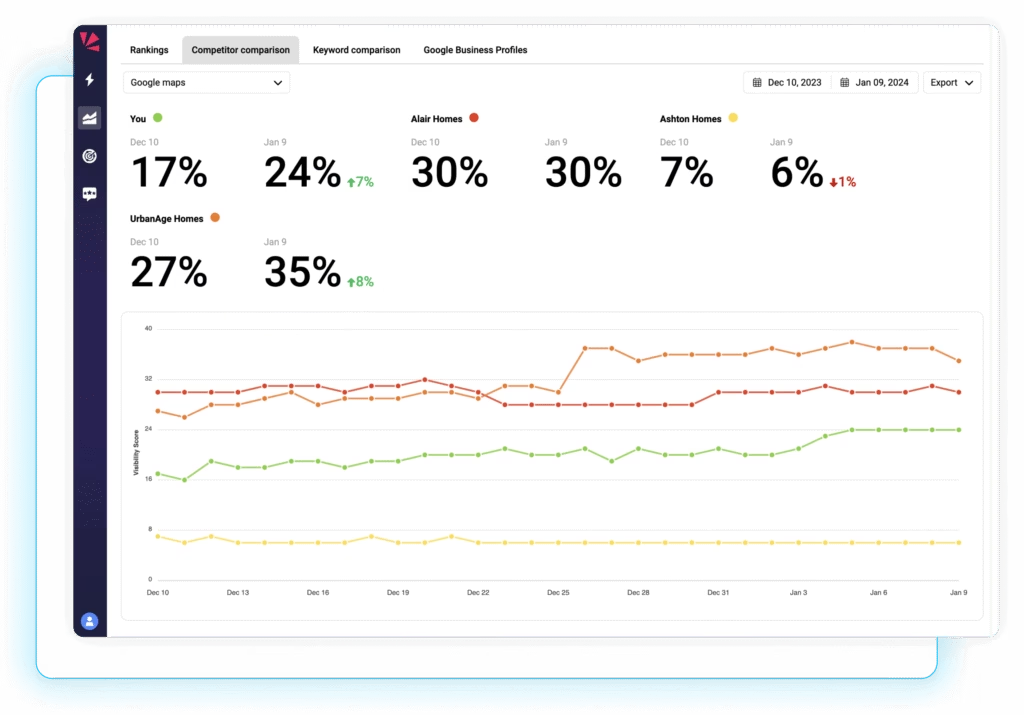
Compared to BrightLocal, Whitespark is the best alternative for manual citation building and detailed competitive citation research. BrightLocal offers automated citation submission and tracking, but the Whitespark Local Citation Finder provides deeper insights into where competitors are listed and where high-value opportunities exist. WhiteSpark offers a GBP management platform that blocks unwanted Google edits, supports bulk location updates, and sends change alerts in real time.
Whitespark is a cheaper BrightLocal alternative, with pricing starting at $1/month per location for the Local Platform, $14/month for the Local Rank Tracker, and $79/month per location for the Reputation Builder. Citation building is a one-time service with per-submission pricing, which makes it cost-effective for one-off cleanups.
Pros in our Whitespark review include precise citation audits, multilingual review requests, and flexible à la carte pricing.
The downsides of Whitespark are the lack of a fully unified dashboard and the need to purchase multiple tools separately to match BrightLocal’s all-in-one coverage.
In the BrightLocal vs. Whitespark comparison, Whitespark offers stronger manual citation strategies and GBP change management, while BrightLocal provides a more consolidated platform with automated reporting, review collection, and local SEO audits.
12. Moz Local
Moz Local is an alternative to Brightlocal because it’s an all-in-one local SEO platform designed to automate listings management, monitor reviews, and provide location-based performance insights. Moz Local syncs business data across major directories, social platforms, and data aggregators, which reduces the manual work of maintaining citation accuracy.
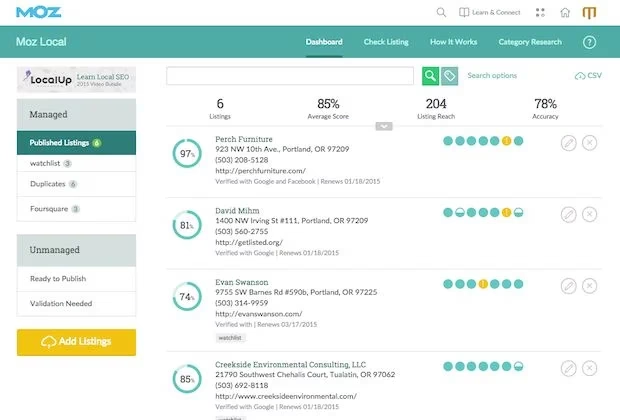
Compared to BrightLocal, Moz Local is the best alternative for businesses that prioritize automation over manual control. BrightLocal gives agencies granular, hands-on management, while Moz Local’s strength is in auto-syncing data across Google, Facebook, Apple Maps, and 40+ other platforms. Moz Local integrates social media scheduling, review monitoring, and engagement tracking into one central dashboard.
Moz Local pricing starts at $16/month for Lite (basic listings management), $24/month for Preferred (adds review monitoring and social posting), and $33/month for Elite (adds expanded directory submissions and reporting templates).
Pros in our Moz Local review include automated multi-platform updates, review response templates, and GeoRank tracking for hyper-local keyword positions.
Cons of Moz Local are fewer customizations for agencies and more limited citation audit features compared to BrightLocal.
When comparing BrightLocal vs. Moz Local, Moz Local works best for brands that want automated, always-on listings management at scale, while BrightLocal is stronger for hands-on citation building and deeper local SEO audits.
13. Synup
Synup is an alternative to Brightlocal because it’s a local marketing and agency operations platform that manages GBP listings, maintains NAP (Name, Address, Phone) accuracy, and monitors business profiles across directories. Synup centralizes agency workflows with tools for review management, social posting, invoicing, CRM, and SEO reporting in a white-label client portal. It includes AI-driven review responses, sentiment analysis, and bulk listing updates for multiple locations.
Compared to BrightLocal, Synup is the best alternative for agencies that need combined GBP optimization, citation accuracy, and multi-location profile monitoring alongside client management and billing. BrightLocal focuses on local SEO audits, citation building, and review reporting, while Synup adds operational tools such as sales pipelines, invoicing, and branded dashboards.
Synup is a paid BrightLocal alternative, with pricing starting at $79/month for 25 locations and scaling to $799/month for 500 locations and advanced agency features.
Strong points of the Synup review include deep white-label customization, AI-assisted engagement, and integrated CRM with invoicing.
Cons of Synup include higher starting costs than BrightLocal and fewer native local SEO auditing features.
In the Synup vs. BrightLocal comparison, BrightLocal offers more built-in SEO audits, while Synup delivers deeper CRM, invoicing, and automation features for agency workflows.
14. Semrush Local
Semrush Local is an alternative to Brightlocal because it’s a local SEO add-on that manages Google Business Profile (GBP) optimization, multi-directory listings, map rank tracking, and review monitoring. Semrush Local streamlines business information management to maintain accuracy and improve visibility across Google Maps, directories, and search engines. Agencies use it for location-specific rank tracking, competitor benchmarking, and integrating local SEO into broader marketing campaigns through the full Semrush suite.
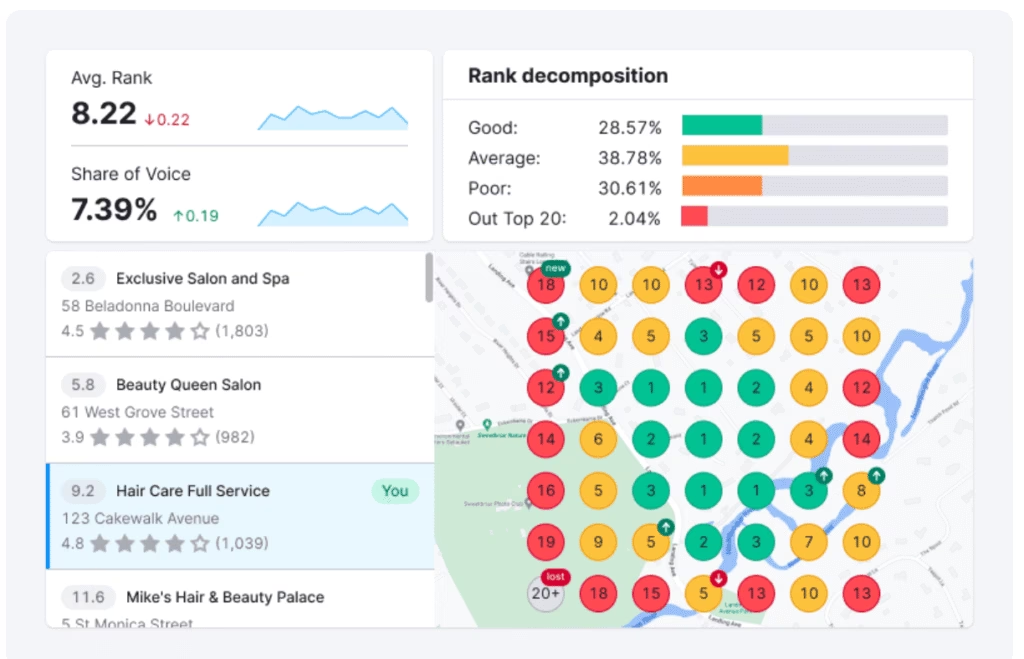
Compared to BrightLocal, Semrush is better suited for businesses that want to manage all local and national SEO in one platform. Popular Semrush Local features include position tracking for location-specific keywords, automated listings distribution to platforms such as Google, Facebook, and Apple Maps, and on-page SEO suggestions for local websites.
Semrush Local provides competitor analysis, AI-assisted GBP posting, review monitoring with negative mention alerts, and a social media scheduling tool to improve local engagement.
Semrush Local is a paid BrightLocal alternative, available as a standalone tool or an add-on to Semrush subscriptions. Pricing starts at $30/month per location for Light, $50/month for Essentials, and $60/month for Advanced, with annual and monthly billing options.
Key local benefits identified in the Semrush SEO tool review include local module integration with keyword, audit, and competitor tools, robust reporting, and white-label options for agencies.
Cons of Semrush Local include higher pricing for large location networks and less control over non-partner directories.
In the BrightLocal vs. Semrush comparison, BrightLocal offers more affordable citation tracking and local SEO audits, while Semrush combines local visibility tools with a broader SEO and PPC suite for multi-channel optimization.
15. Google Business Profile Manager
Google Business Profile Manager is an alternative to Brightlocal because it’s a free tool from Google that lets businesses manage their presence across Google Search and Google Maps. Google Business Profile Manager supports profile creation, NAP (Name, Address, Phone) updates, service and product listings, review management, and post publishing directly in the SERP interface.
Compared to BrightLocal, Google Business Profile Manager is the best free alternative for direct GBP optimization and engagement. BrightLocal adds rank tracking, citation audits, and multi-location reporting, while GBP Manager focuses on ensuring accurate business information, responding to reviews, and publishing posts without extra cost.
Google Business Profile Manager is free to use for all verified business owners.
Pros in our Google Business Profile review include native Google integration, instant profile updates, and no usage limits. The cons of GBP Manager are the absence of advanced reporting, heatmaps, or competitor tracking without connecting to third-party tools.
Why Do People Seek Alternatives to BrightLocal?
People seek alternatives to BrightLocal when they need lower-cost plans, faster updates, or more advanced automation for local SEO. BrightLocal SEO software is popular for rank tracking, Google Business Profile (GBP) management, citation building, and review reporting, but some users report limitations that make them explore other options.
The most common reasons include pricing concerns, especially for agencies managing many locations, feature gaps such as advanced review automation, heatmap precision, or competitive benchmarking, and platform constraints like credit-based usage, limited white-label flexibility, or slower interface performance.
Evidence from user reviews shows that while BrightLocal delivers strong customer support, ease of use, and accurate local SEO audits, some businesses prefer low-cost BrightLocal alternatives with real-time SERP data, broader directory coverage, or integrated CRM and invoicing tools. Others switch to competitors when they need multi-location reporting at scale, more precise geo-grid visibility, or direct integrations with platforms like Google Search Console, Facebook, and Apple Maps.
What to Look for in a BrightLocal Alternative?
The features to look for in a BrightLocal alternative are broader local SEO coverage, easier scaling, and deeper integrations while fixing BrightLocal’s limitations in pricing flexibility, reporting depth, and automation. These local SEO features address common shortcomings in BrightLocal SEO software for agencies, franchises, and multi-location brands.
The 10 features to look for in a BrightLocal replacement are below.
- Local Rank Tracking Without Limits. BrightLocal restricts tracking credits. Choose a platform with unlimited daily scans across devices, locations, and Google Maps SEO results for more accurate visibility reporting.
- Comprehensive Citation Management. BrightLocal offers manual updates. A strong alternative automates local citations services, syncs across directories, and maintains NAP SEO consistency in real time.
- Advanced Google Business Profile Integration. BrightLocal supports GBP but with posting caps. Look for Google Business Profile tools that enable bulk edits, AI-powered content, and GBP performance dashboards.
- Streamlined Review Monitoring and Response. BrightLocal tracks reviews but lacks AI sentiment scoring. Better platforms centralize Google Reviews, competitor comparisons, and automated response suggestions.
- Detailed Multi-Location Reporting. BrightLocal reporting is customizable but basic. Choose platforms with local SEO report features that consolidate all branches, franchisees, or clients in a single view.
- Competitor Benchmarking for Local Markets. BrightLocal offers limited side-by-side comparisons. Seek tools with competitor heatmaps, keyword gaps, and backlink profiling specific to local SEO for multiple locations.
- Unlimited Map Pack Heatmaps. BrightLocal charges per scan. An alternative should provide unrestricted heatmaps and historical comparisons for Google Maps SEO positioning.
- In-Depth Local Keyword Research. BrightLocal does not offer full keyword analysis. Choose platforms with geo-targeted keyword research tied directly to local SEO strategy.
- Automated Local SEO Audits. The BrightLocal audit tools are basic. A better choice includes Core Web Vitals, schema markup, and Google Business Profile health checks in every local SEO audit.
- Transparent, Flexible Pricing. BrightLocal uses credit-based billing. Select alternatives to BrightLocal that offer tiered or flat-rate plans without hidden limits for locations, users, or features.
Which BrightLocal Alternative Offers the Best Balance of Features and Price?
Search Atlas offers the best balance of features and price among all BrightLocal alternatives. Unlike platforms that limit core local SEO tools to premium tiers, Search Atlas includes complete functionality such as local rank tracking, citation monitoring, business listing management, review tracking, local competitor analysis, and automated reporting starting at $99/month.
Search Atlas delivers more value per dollar than BrightLocal by combining advanced local SEO capabilities with full-scale SEO features like OTTO SEO automation, SCHOLAR content scoring, native Google Search Console integration, and multi-location management in a single subscription. The Search Atlas SEO platform replaces multiple single-purpose tools by providing an all-in-one solution without feature gating.
While BrightLocal and its local alternatives focus primarily on local listings and reputation management, Search Atlas offers a broader toolkit for both local and organic SEO, which makes it suitable for agencies, multi-location businesses, and in-house teams that are managing end-to-end SEO campaigns.
Users switching from BrightLocal to Search Atlas report faster reporting speeds, broader feature coverage, and improved workflow efficiency, all without the need to purchase add-ons for advanced functionality.
Try Search Atlas free today to experience the most complete and cost-effective BrightLocal alternative for local SEO and overall search visibility.





